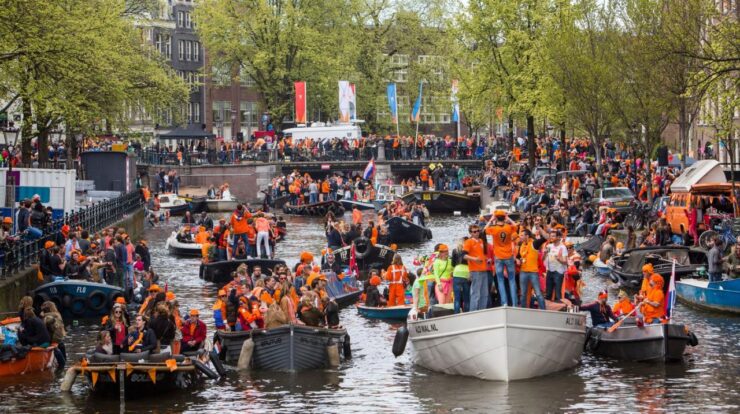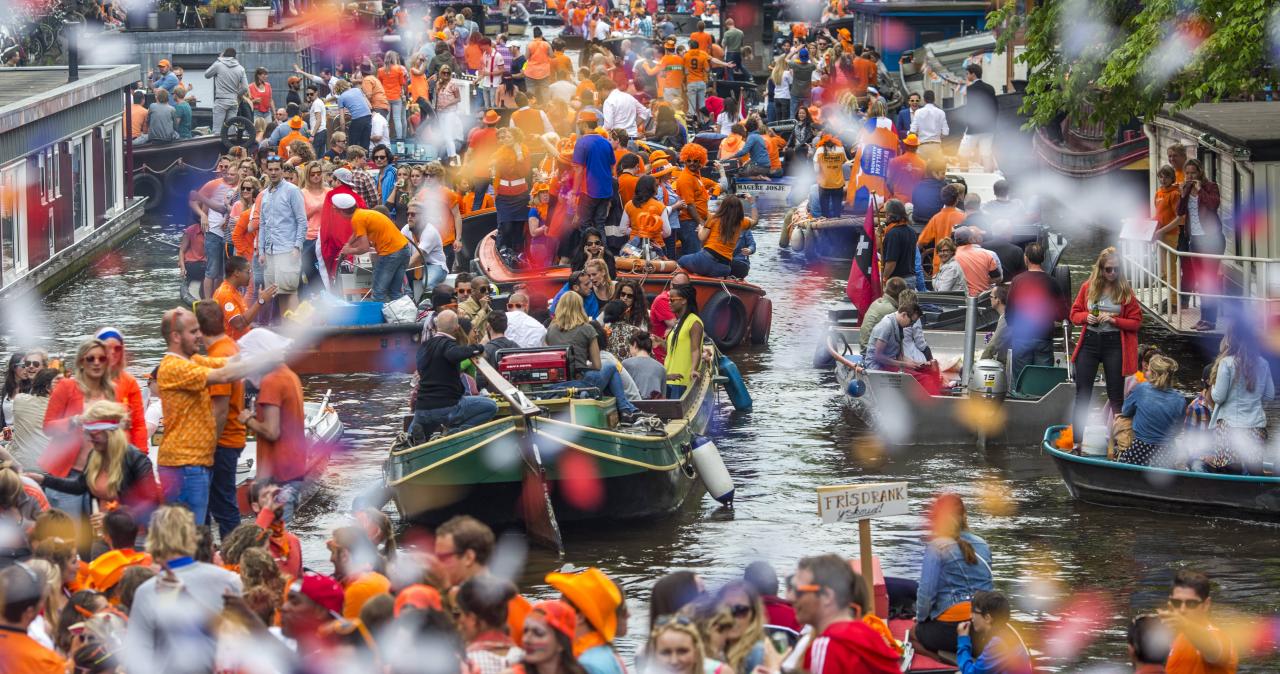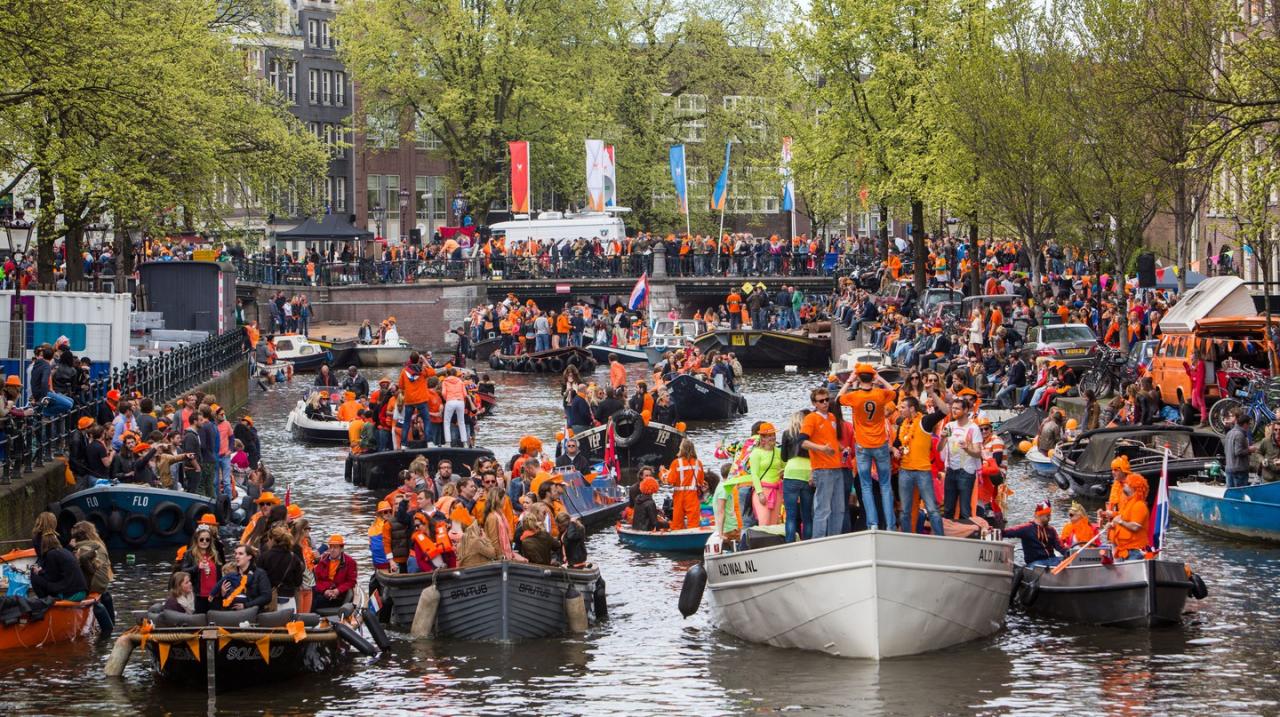
As Kingsday Netherlands takes center stage, this opening passage beckons readers into a world crafted with journalistic flair and a distinct news tone, ensuring a reading experience that is both absorbing and distinctly original.
This cherished Dutch holiday, celebrated annually on April 27th, pays homage to King Willem-Alexander’s birthday and serves as a vibrant expression of national unity and pride. With its roots deeply embedded in Dutch history, Kingsday has evolved into a captivating spectacle that draws visitors from far and wide.
Kingsday Celebration History
Kingsday, celebrated annually on April 27th in the Netherlands, is a national holiday commemorating the birthday of King Willem-Alexander. The celebration has its roots in the 19th century, when it was known as Queen’s Day and celebrated the birthday of Queen Wilhelmina.
The Dutch monarchy has played a central role in the development and evolution of Kingsday. The House of Orange-Nassau, the current ruling dynasty, has a long and storied history in the Netherlands. Kingsday serves as a symbol of national unity and pride, reinforcing the bond between the monarchy and the Dutch people.
Over time, Kingsday traditions have evolved and adapted to reflect changing social and cultural norms. In the early days, the celebration was primarily a formal affair, with parades and official ceremonies. Today, it has transformed into a vibrant and festive event, characterized by colorful decorations, street markets, and live music.
Key Elements of Kingsday Festivities
Kingsday celebrations are renowned for their vibrant atmosphere and unique characteristics. The streets of Dutch cities and towns are adorned with orange decorations, the official color of the celebration, representing the Dutch royal family.
Music plays an integral role in Kingsday festivities, with street performers, bands, and DJs creating a lively and energetic atmosphere. Flea markets and street vendors line the streets, offering a wide variety of goods, from traditional Dutch souvenirs to handmade crafts.
The color orange holds great significance in Kingsday celebrations, symbolizing the Dutch royal family and national pride. Participants often dress in orange clothing or accessories, and the streets are decorated with orange flags, streamers, and balloons.
Cultural Significance and Impact
Kingsday is deeply rooted in Dutch culture and society. It is a day of celebration and unity, bringing people together from all walks of life. The event fosters a sense of national pride and reinforces the bond between the Dutch people and their monarchy.
Kingsday has a significant economic impact on the Netherlands. The influx of tourists and the increased spending on goods and services contribute to the country’s economy. Additionally, the celebration provides a platform for local businesses and entrepreneurs to showcase their products and services.
International Recognition and Influence: Kingsday Netherlands

Kingsday has gained international recognition and inspired similar celebrations around the world. The event has been featured in international media and travel publications, showcasing its unique charm and cultural significance.
The Netherlands has shared its Kingsday traditions with other countries, leading to the adoption of similar celebrations in places like Aruba, Curacao, and Sint Maarten. These events have fostered cultural exchange and promoted Dutch heritage on a global scale.
Kingsday can be compared to other major festivals around the world, such as Carnival in Brazil and Oktoberfest in Germany. These events share common elements, such as vibrant street parades, music, and festive atmospheres, while also showcasing unique cultural traditions and national pride.
Challenges and Sustainability

Kingsday celebrations can pose potential challenges related to waste management, noise pollution, and crowd control. Large crowds and increased consumption can lead to environmental concerns, requiring sustainable solutions to minimize the impact on the environment.
Organizers and municipalities have implemented measures to address these challenges, such as promoting waste reduction, encouraging the use of reusable materials, and implementing noise control regulations. Technological advancements, such as mobile apps and online platforms, have also been utilized to enhance crowd management and safety.
Closure
In conclusion, Kingsday Netherlands stands as a testament to the enduring spirit of Dutch culture, fostering a sense of unity and pride that transcends generations. Its vibrant traditions, colorful festivities, and global recognition make it a truly exceptional celebration that continues to captivate hearts and minds.
FAQ
What is the significance of orange in Kingsday celebrations?
Orange is the official color of the Dutch royal family, and it has become synonymous with Kingsday festivities. During the celebration, the streets are adorned with orange decorations, and revelers often wear orange clothing or accessories to show their support for the monarchy.
How has Kingsday evolved over time?
Kingsday has undergone several changes throughout its history. Originally known as Queen’s Day, the celebration was renamed Kingsday in 2013 when King Willem-Alexander ascended to the throne. The event has also become more commercialized in recent years, with businesses and organizations using it as an opportunity to promote their products or services.
What is the economic impact of Kingsday?
Kingsday is a major economic event for the Netherlands. The celebration generates billions of euros in revenue for businesses across the country. The influx of tourists and the increased spending by locals contribute to the economic boost.